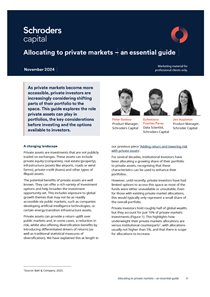by Peter Sankey, Product Manager, Private Assets; Eufemiano Fuentes Perez, Data Scientist; and Jen Appleton, Product Manager, Private Assets
Key Takeaways
- New products, regulations, and technology have expanded private market access.
- Private markets can diversify and enhance a traditional 60/40 portfolio.
- Private assets can improve risk-return ratios, meeting specific investor goals. We demonstrate how.
- Private market investment requires long-term dedication, thorough research, and risk understanding.
- Open-ended evergreen funds: an appealing option for private market newcomers.
As private markets become more accessible, private investors are increasingly considering shifting parts of their portfolio to this space. While this trend accelerates, private investors remain under allocated compared to their institutional counterparts.
Our research indicates that globally institutional investors had allocated, on average, 14% of their portfolio to private assets. In comparison, typical clients’ allocation to private assets for most financial advisers and wealth managers globally ranges between 5% to less than 10%. For 30% of wealth managers we surveyed the allocation to private asset investments is even lower, at 1% to less than 5%.
There are different ways private clients can incorporate private assets into a traditional portfolio to achieve their goals. What portion of the portfolio to invest in these assets, how much to allocate to each asset or what investment vehicle to choose are some of the biggest questions keen investors and their wealth managers are faced with today.
While our paper doesn’t provide advice on specific allocations, we've detailed essential factors for investors considering private markets, and the potential implications of such an allocation for their portfolios.
Download the full paper
